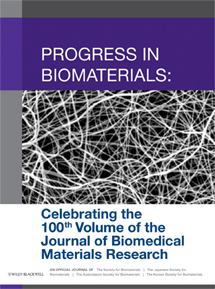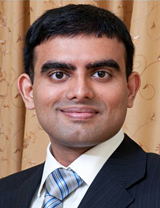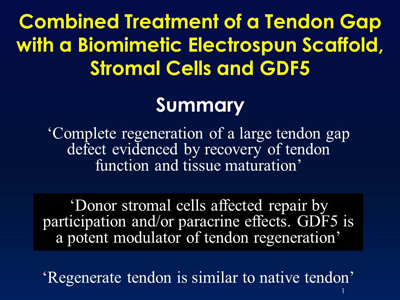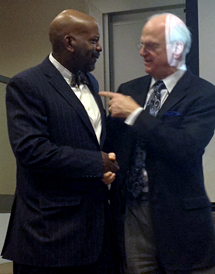 The Journal of Biomedical Materials Research (JBMR) has just published its 100th volume, Progress in Biomaterials, which features the top 25 papers it has published in its 50+ years. I am happy to report that one of our lab’s papers, “Electrospun nanofibrous structure: A novel scaffold for tissue engineering” was selected for inclusion. This article has been cited more than 1100 times. According to JBMR, the major criteria for inclusion of papers in this virtual issue was “the identification of articles that, in their time, were considered novel, original, state-of-the-art, groundbreaking, led to clinical application, and opened new areas of biomaterials research.” The editors commented “this pioneering paper by Laurencin showed that biodegradable electrospun nanofiber structures were capable of supporting cell attachment and proliferation and indicated that cells seeded on this structure could maintain phenotypic shape and guide growth according to nanofiber orientation.” Perhaps even more exciting, the editors chose figure 2 of our paper for the cover of the 100th Volume Celebration Edition.
The Journal of Biomedical Materials Research (JBMR) has just published its 100th volume, Progress in Biomaterials, which features the top 25 papers it has published in its 50+ years. I am happy to report that one of our lab’s papers, “Electrospun nanofibrous structure: A novel scaffold for tissue engineering” was selected for inclusion. This article has been cited more than 1100 times. According to JBMR, the major criteria for inclusion of papers in this virtual issue was “the identification of articles that, in their time, were considered novel, original, state-of-the-art, groundbreaking, led to clinical application, and opened new areas of biomaterials research.” The editors commented “this pioneering paper by Laurencin showed that biodegradable electrospun nanofiber structures were capable of supporting cell attachment and proliferation and indicated that cells seeded on this structure could maintain phenotypic shape and guide growth according to nanofiber orientation.” Perhaps even more exciting, the editors chose figure 2 of our paper for the cover of the 100th Volume Celebration Edition.
Congratulations to all.
Image was adpated from http://onlinelibrary.wiley.com/journal/10.1002/(ISSN)1552-4981/homepage/VirtualIssuesPage.html.
 I am pleased to announce that Dr. Roshan James recently joined the Institute for Regenerative Engineering as a postdoctoral fellow. His current research focuses on the design and fabrication of novel biomaterials for musculoskeletal tissue engineering. His research interests include biomaterials, integrated tissues, and regenerative engineering.
I am pleased to announce that Dr. Roshan James recently joined the Institute for Regenerative Engineering as a postdoctoral fellow. His current research focuses on the design and fabrication of novel biomaterials for musculoskeletal tissue engineering. His research interests include biomaterials, integrated tissues, and regenerative engineering. It is worth noting that Dr. James has made a significant impact on tendon tissue engineering. He has successfully developed a novel tubular scaffold system to regenerate a large gap defect in tendon tissue due to severe injuries. The scaffold system can also deliver adipose stromal cells and growth factors that facilitate the regenerative process resulting in new tendon tissue formation.
It is worth noting that Dr. James has made a significant impact on tendon tissue engineering. He has successfully developed a novel tubular scaffold system to regenerate a large gap defect in tendon tissue due to severe injuries. The scaffold system can also deliver adipose stromal cells and growth factors that facilitate the regenerative process resulting in new tendon tissue formation. To further facilitate collaborations between UConn and internationally renowned experts, it was our great honor to host Ronald W. Rousseau, chair of the School of Chemical and Biomolecular Engineering at Georgia Institute of Technology. Dr. Rousseau, the Cecil J. “Pete” Silas Endowed Chair, delivered a talk entitled “Chirally Pure Pharmaceutical Products: The Role of Crystallization” in the Department of Chemical, Materials and Biomolecular Engineering at Storrs. His research focuses on separation processes and has resulted in more than 200 publications. Dr. Rousseau has received numerous awards including the prestigious Warren K. Lewis Award from the American Institute of Chemical Engineers (AIChE), the Clarence G. Gerhold Award from the AIChE’s Separations Division and the AIChE’s Forest Products Award. He is a fellow of both AIChE and the American Association for the Advancement of Science (AAAS). It was an honor having Dr. Rousseau at UConn, and we look forward to collaborating with him in the future.
To further facilitate collaborations between UConn and internationally renowned experts, it was our great honor to host Ronald W. Rousseau, chair of the School of Chemical and Biomolecular Engineering at Georgia Institute of Technology. Dr. Rousseau, the Cecil J. “Pete” Silas Endowed Chair, delivered a talk entitled “Chirally Pure Pharmaceutical Products: The Role of Crystallization” in the Department of Chemical, Materials and Biomolecular Engineering at Storrs. His research focuses on separation processes and has resulted in more than 200 publications. Dr. Rousseau has received numerous awards including the prestigious Warren K. Lewis Award from the American Institute of Chemical Engineers (AIChE), the Clarence G. Gerhold Award from the AIChE’s Separations Division and the AIChE’s Forest Products Award. He is a fellow of both AIChE and the American Association for the Advancement of Science (AAAS). It was an honor having Dr. Rousseau at UConn, and we look forward to collaborating with him in the future.